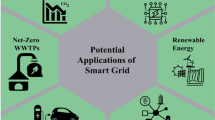Abstract
Energy forms part of our day to day life. Access to energy is required to support a number of social and economic activities including transportation, communication and production of goods. Without access to electricity, education and health services cannot operate optimally which may impact welfare and human capital development. Access to energy in Africa is lower that the world average with almost 70% of the population without access to electricity. In addition to lack of access, there is no guaranteed supply of electricity for those who have access which threatens economic growth. Access to energy in Africa has increased in recent decades, however, the electrification rate is lower than the population and urban growth. Africa is endowed with natural energy sources that remain untapped. Smart energy technologies provide opportunities to generate, transmit, distribute and use energy in a sustainable manner. This chapter reviews the status of smart energy development in Africa. Access to energy in Africa varies from country to country, with some countries like Egypt, Tunisia and South Africa having more than 80% of people with access to electricity while in other countries less than 10% of population have access to electricity. Implementation of smart energy systems relies on Information and Communication Technologies (ICTs). Smart energy is the solution for Africa to increase access and improve reliability of the energy supply in the continent. This chapter also appraises the status of ICT infrastructure and highlights some of the case studies on smart energy systems aimed at energy efficiency and smart grid development.
Access this chapter
Tax calculation will be finalised at checkout
Purchases are for personal use only
Similar content being viewed by others
Notes
- 1.
African Economic Outlook https://www.afdb.org/fileadmin/uploads/afdb/Documents/Publications/AEO_2017_Report_Full_English.pdf.
- 2.
Worldbank (2017). State of electricity access report. http://documents.worldbank.org/curated/en/364571494517675149/pdf/114841-REVISED-JUNE12-FINAL-SEAR-web-REV-optimized.pdf.
- 3.
Sbia, R., Shahbaz, M., Ozturk, I. (2017). Economic growth, financial development, urbanisation and electricity consumption nexus in UAE. Economic Research-Ekonomska Istraživanja.
- 4.
African development bank Group (2012). Urbanization in Africa. https://www.afdb.org/en/blogs/afdb-championing-inclusive-growth-across-africa/post/urbanization-in-africa-10143/.
- 5.
Smart Villages (2016). Why energy is a priority in sustainable development. http://e4sv.org/about-us/what-are-smart-villages/.
- 6.
United nations economic and Social Council (2017). Progress towards the Sustainable Development Goals. http://www.un.org/ga/search/view_doc.asp?symbol=E/2017/66&Lang=E.
- 7.
UN HABITAT. Energy. https://unhabitat.org/urban-themes/energy/.
- 8.
United Nations. 17 Goals to transform out world. http://www.un.org/sustainabledevelopment/energy/.
- 9.
World Bank (2017). Making Renewable Energy More Accessible in Sub-Saharan Africa. http://www.worldbank.org/en/news/feature/2017/02/13/making-renewable-energy-more-accessible-in-sub-saharan-africa.
- 10.
ESI-Africa (2017). World Bank calls for increased private participation in Africa’s transmission infrastructure. https://www.esi-africa.com/world-bank-electricity-transmission-infrastructure/.
- 11.
- 12.
Pielli, K., Dhungel, H., Mason, D., Tobin, D., Gottfried, D. (2014). Examining energy efficiency issues in sub-Saharan Africa. https://www.usaid.gov/powerafrica/newsletter/dec2014/smarter-power-in-africa.
- 13.
International Telecommunication Union (2016). Measuring the Information Society Report. https://www.itu.int/en/ITU-D/Statistics/Documents/publications/misr2016/MISR2016-w4.pdf.
- 14.
International Telecommunication Union (2016). ICT facts and figures. https://www.itu.int/en/ITU-D/Statistics/Documents/facts/ICTFactsFigures2016.pdf.
- 15.
Agenda 2063, http://www.un.org/en/africa/osaa/pdf/au/agenda2063.pdf.
- 16.
- 17.
- 18.
- 19.
Eskom, 2016, http://www.eskom.co.za/news/Pages/Apr20.aspx.
- 20.
Climate and Development Knowledge Network, PROJECT: ESMAP: The Lighting Africa Programme, https://cdkn.org/project/esmap-2-the-lighting-africa-programme/?loclang=en_gb.
- 21.
IOL news, 2014, Energy-smart building impresses, https://www.iol.co.za/news/south-africa/gauteng/energy-smart-building-impresses-1787385.
- 22.
Phillips, Energy efficient LED, https://www.philips.co.za/c-m-li/led-lights/eco-friendly-led-light.
- 23.
- 24.
Ben Hagan, E., R. van Buskirk, A. Ofosu-Ahenkorah, M.A. McNeil (2006). Refrigerator Efficiency in Ghana: Tailoring an appliance market transformation program design for Africa. In Energy Policy, 35 (4).
- 25.
United States Environmental Protection Agency, Global Greenhouse Gas Emissions Data, https://www.epa.gov/ghgemissions/global-greenhouse-gas-emissions-data.
- 26.
Stockholm Environment Institute, 2013, Transport and Environment in Sub-Saharan Africa, https://www.sei-international.org/mediamanager/documents/Publications/sei-pb-2013-africa-transport.pdf.
- 27.
Morocco World News, 2018, Morocco’s High Speed Train to Become Operational in Fall 2018, https://www.moroccoworldnews.com/2018/07/250393/high-speed-train-fall-2018/.
- 28.
CNN travel, 2017, Morocco to get Africa's first high-speed train https://edition.cnn.com/travel/article/morocco-high-speed-tgv-trains/index.html?gallery=0.
- 29.
Geospatial World, 2011, Gautrain, South Africa – An effective solution to Gauteng’s traffic woes, https://www.geospatialworld.net/article/gautrain-south-africa-an-effective-solution-to-gautengs-traffic-woes/.
- 30.
Business tech, 2017, These are the new routes planned for the next phase of the Gautrain https://businesstech.co.za/news/finance/161169/these-are-the-new-routes-for-the-next-phase-of-the-gautrain/.
- 31.
NEPAD, 2018, Progress on the African Integrated High Speed Railway Network, http://www.nepad.org/content/progress-african-integrated-high-speed-railway-network.
- 32.
Engineering News, 2017, Renewable energy, critical to meeting Africa’s energy needs by 2040, http://www.engineeringnews.co.za/article/renewable-energy-critical-to-meeting-africas-energy-needs-by-2040-2017-11-27.
- 33.
Joshua S Hill, Engineering news, 2017, Investment Vital To Unlocking Africa’s Untapped Renewable Energy Potential https://cleantechnica.com/2017/02/17/investment-vital-unlocking-africas-untapped-renewable-energy-potential/.
- 34.
Britta Rennkamp, 2012, South African approaches to MRV of mitigation actions: the case of installing solar water heaters\.
- 35.
Alli D. Mukasa, Emelly Mutambatsere, Yannis Arvanitis and Thouraya Triki, 2013, Development of Wind Energy in Africa, https://www.afdb.org/fileadmin/uploads/afdb/Documents/Publications/Working%20Paper%20170%20-%20Development%20of%20Wind%20Energy%20in%20Africa.pdf.
- 36.
World Bank, urban development series – knowledge papers, chapter 3, http://siteresources.worldbank.org/INTURBANDEVELOPMENT/Resources/336387-1334852610766/Chap3.pdf.
- 37.
N. Scarlat, V. Motola, J.F. Dallemand, F. Monforti-Ferrario & Linus Mofor, 2015, Evaluation of energy potential of Municipal Solid Waste from African urban areas, Renewable and Sustainable Energy Reviews 50 (2015) 1269–1286.
- 38.
Climate Action programme, 2017, Africa’s first waste-to-energy plant to be commissioned in Ethiopia, http://www.climateactionprogramme.org/news/africas-first-waste-to-energy-plant-to-be-commissioned-in-ethiopia.
- 39.
Engineering news,2017, Ground-breaking waste-to-energy plant opens in Cape Town http://www.engineeringnews.co.za/article/ground-breaking-waste-to-energy-plant-opens-in-cape-town-2017-01-24/rep_id:4136.
- 40.
Infrastructure news, 2016, SA’s first independent landfill gas-to-power project powers up, http://www.infrastructurene.ws/2016/12/15/sas-first-independent-landfill-gas-to-power-project-powers-up/.
- 41.
Infrastructure news, 2016, Off grid energy solution goes live in SA school, http://www.infrastructurene.ws/2016/03/02/off-grid-energy-solution-goes-live-in-sa-school/.
- 42.
Lighting Africa, https://www.lightingafrica.org/about/.
Author information
Authors and Affiliations
Corresponding author
Editor information
Editors and Affiliations
Rights and permissions
Copyright information
© 2019 Springer Nature Singapore Pte Ltd.
About this chapter
Cite this chapter
Mudau, N., Mhangara, P. (2019). Smart Energy for Smart Infrastructure Development. In: Mboup, G., Oyelaran-Oyeyinka, B. (eds) Smart Economy in Smart African Cities. Advances in 21st Century Human Settlements. Springer, Singapore. https://doi.org/10.1007/978-981-13-3471-9_7
Download citation
DOI: https://doi.org/10.1007/978-981-13-3471-9_7
Published:
Publisher Name: Springer, Singapore
Print ISBN: 978-981-13-3470-2
Online ISBN: 978-981-13-3471-9
eBook Packages: Earth and Environmental ScienceEarth and Environmental Science (R0)




